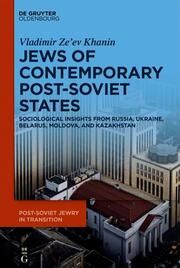The Jews of Contemporary Post-Soviet States
Lieferzeit: 5 Werktage(inkl . Versand)
Since the end of the USSR, post-Soviet Jewry has evolved into an ethnically and culturally diverse Russian speaking community. This process is taking place against the gradual inflation of a collective identity among Russian-speaking Jews that survived the first post-Soviet decade. The infrastructure for this new entity is provided by new local (or ethno-civic) groups of East European Ashkenazi Jewry with specific communal, subcultural, and ethno-political identities (Ukrainian, Moldavian, or Russian Jews, e.g.). These communities demonstrate a changing balance of identification between their countries of residence and the transnational Russian-Jewish community, and they absorb a significant number of persons of non-Jewish and ethnically heterogeneous origins as well. This book discusses identity, community modes, migration dynamics, socioeconomic status, attitudes toward Israel, social and political environments, and other parameters framing these trends using the results of a comprehensive sociological study of the extended Jewish population conducted in 2019-2020 by this author in the five former-Soviet Union countries (Russia, Ukraine, Belarus, Moldova, and Kazakhstan).
Vladimir Zeev Khanin, Bar-Ilan University and Israeli Ministry of Aliya and Integration, Israel.
| Autor | Khanin, Vladimir Zeev |
|---|---|
| Verlag | De Gruyter Oldenbourg |
| ISBN | 9783110790986 |
| ISBN/EAN | 9783110790986 |
| Lieferzeit | 5 Werktage(inkl . Versand) |
| Erscheinungsdatum | 15.03.2023 |
| Lieferbarkeitsdatum | 29.10.2023 |
| Einband | Gebunden |
| Format | 2.3 x 23.5 x 16.5 |
| Seitenzahl | XI, 301 S., 1 s/w Zeichng., 156 s/w Tab., 156 b/w tbl., 1 b/w graphics |
| Gewicht | 574 |
Weitere Informationen
| Verlag | De Gruyter Oldenbourg |
|---|---|
| ISBN | 9783110790986 |
| Erscheinungsdatum | 15.03.2023 |
| Einband | Gebunden |
| Format | 2.3 x 23.5 x 16.5 |
| Gewicht | 574 |
Since the end of the USSR, post-Soviet Jewry has evolved into an ethnically and culturally diverse Russian speaking community. This process is taking place against the gradual inflation of a collective identity among Russian-speaking Jews that survived the first post-Soviet decade. The infrastructure for this new entity is provided by new local (or ethno-civic) groups of East European Ashkenazi Jewry with specific communal, subcultural, and ethno-political identities (Ukrainian, Moldavian, or Russian Jews, e.g.). These communities demonstrate a changing balance of identification between their countries of residence and the transnational Russian-Jewish community, and they absorb a significant number of persons of non-Jewish and ethnically heterogeneous origins as well. This book discusses identity, community modes, migration dynamics, socioeconomic status, attitudes toward Israel, social and political environments, and other parameters framing these trends using the results of a comprehensive sociological study of the extended Jewish population conducted in 2019-2020 by this author in the five former-Soviet Union countries (Russia, Ukraine, Belarus, Moldova, and Kazakhstan).
Vladimir Zeev Khanin, Bar-Ilan University and Israeli Ministry of Aliya and Integration, Israel.
Kategorie

